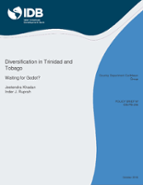Diversification in Trinidad and Tobago: Waiting for Godot?
Date
Oct 2016
Economic diversification is an incessant theme threading policy discussion in Trinidad and Tobago, although with an ebb and flow over time. This topic is once again at the forefront of policy discussions following the recent oil price decline and subsequent to the new administration that took office in September 2015. This policy brief discusses the potential role that the exchange rate plays in diversification, fiscal adjustment and economic growth. In doing so we use a new estimation of the real effective exchange rate that better captures competitiveness of the country's non-oil exports. The evidence assembled in this policy brief suggests that the exchange rate could have an important role in fiscal adjustment, economic growth, and diversification. We find that a major change in the exchange rate would reduce the size of the fiscal adjustment in the short term. It would boost diversification of non-energyexport products and their markets over the medium term, hence spur economic growth and employment. Presumably, there are perceived short-term downsides. These include (i) an inflationary effect which implies reduced household real income and hence a possible increase in poverty, and (ii), increased cost of imported material used as inputs in production, which compounded by microeconomic level balance sheet effects that arise in the presence of liability dollarisation that also leads to negative impacts of real exchange rate devaluations on firms' performance.



